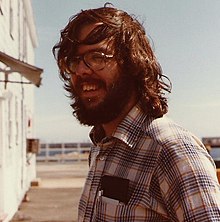David P. Reed
David Patrick Reed | |
|---|---|
 David P. Reed | |
| Born | January 31, 1952 |
| Citizenship | United States |
| Alma mater | MIT |
| Known for | TCP/IP UDP Multiversion concurrency control |
| Scientific career | |
| Fields | Computer Science |
| Institutions | Lotus Software MIT Hewlett-Packard Interval Research |
| Thesis | Processor multiplexing in a layered operating system (1976) |
| Doctoral advisor | Jerome H. Saltzer |
David Patrick Reed (born January 31, 1952) is an American computer scientist, educated at the Massachusetts Institute of Technology, known for a number of significant contributions to computer networking and wireless communications networks.
He was involved in the early development of TCP/IP, and was the designer of the User Datagram Protocol (UDP), though he finds this title "a little embarrassing".[1] He was also one of the authors of the original paper about the end-to-end principle, End-to-end arguments in system design, published in 1984.
He is also known for Reed's law, his assertion that the utility of large networks, particularly social networks, can scale exponentially with the size of the network. (It was first cited in "The Law of the Pack," Harvard Business Review (February 2001) pp 23–4.)
Reed is an Adjunct Professor at the MIT Media Lab in the Viral Communications group and is one of six principal architects of the Croquet project (along with Alan Kay, Julian Lombardi, Andreas Raab, David A. Smith, and Mark McCahill). He is also on the advisory board of TTI/Vanguard.
References
- ^ "udp and me". David P. Reed Blog. Retrieved 16 November 2010.
External links
 Media related to David P. Reed at Wikimedia Commons
Media related to David P. Reed at Wikimedia Commons- Reed's Locus
- Biography
- Naming and synchronization in a decentralized computer system (Reed's thesis, 1978)
